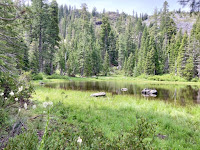Bone of your bone
Fire of your blood
Ash of your flesh
Next week I will have a small ceremony at my house to scatter some of Mike's ashes in a new rose bed. This summer his daughter and I will hike the East Applegate Ridge Trail, which Mike and I helped build, to scatter more of his ashes there. And a friend I've been hiking with lately suggested that whenever I hike, I carry a small vial of ashes with me to scatter in a beautiful place.
With that idea in mind, I did the twelve-mile hike to Azalea Lake yesterday, carrying a small vial of Mike's ashes with me. I was alone at the lake. The azaleas had already started to bloom. An occasional fish broke the surface of the water with a small plop. I took off my clothes and swam.
Bone of your bone
Fire of your blood
Ash of your flesh
I swam to the middle of the lake, then stood upright, treading water, looking at the mountains around me, the burned-out forest with its lush undergrowth of greenery, in which shone hundreds of white plumes of bear grass. Suddenly, out of the anguish of missing Mike, I called for him—"Mi-i-i-ke!"—throwing my voice into the mountain, which tossed the name back to me. I spun slowly in the water, then shouted his name again, to the Red Buttes in the distance; then spun, then cried for him a third time, to the blue sky with its white clouds, and spun slowly again.
I swam the rest of the way across the lake. On the way back, I dove underwater and shouted Mike's name, burbling it three times through the water: for the fish, for the newts, for the frogs.
When I emerged, I bent close to the ground and whispered his name to the azaleas, to the bees, to the thin blue dragonflies.
Bone of your bone
Fire of your blood
Ash of your flesh
A young osprey splashed into the lake for a fish and flew away, empty-fisted.
I stood with the vial of ashes at the edge of the lake, my back to the water and to the wind, facing the mountain. On the first hike Mike and I made to Azalea Lake, I had felt the seed of love opening as I saw how easy it was to be with him, how much we had in common, how much I liked him. Now I would honor this place with his ashes. With a sweep of my arm I threw Mike's ashes into the air, where they dissolved on the wind.
Bone of your bone
Fire of your blood
Ash of your flesh



